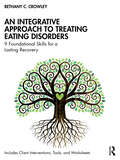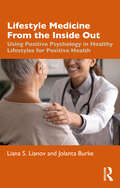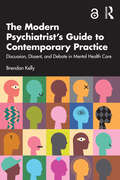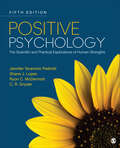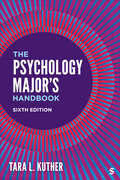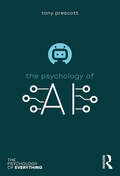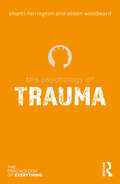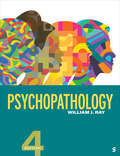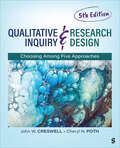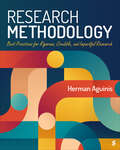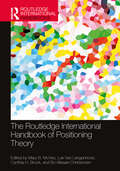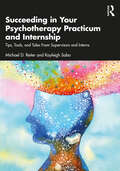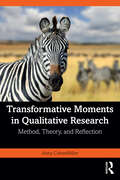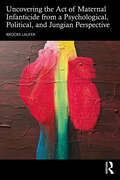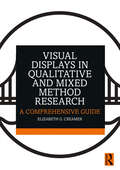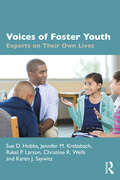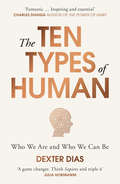- Table View
- List View
An Integrative Approach to Treating Eating Disorders: 9 Foundational Skills for a Lasting Recovery
by Bethany C. CrowleyAn Integrative Approach to Treating Eating Disorders walks therapists through how to effectively resolve the most common yet nuanced struggles that clients with disordered eating face on a daily basis.This straightforward workbook begins by demystifying the complexities and nuances of eating disorders. It then helps therapists understand the need for an integrative approach and walks them through how to assess a client’s biological, psychological, social, and spiritual domains as they correlate with disordered eating behaviors and thoughts. This is accomplished with the BASIC I.D. assessment model and a multimodal therapy framework, both created by Dr. Arnold Lazarus. Nine foundational skills are provided for clients to achieve lasting recovery and avoid the all-too-common relapse rate of eating disorders.Each foundational skill is presented in its own chapter, complete with data, case vignettes, worksheets, and exercises developed over twenty years of research and client management. With this book, therapists both new and experienced will boost their confidence, gain practical tools, and bring more efficiency to their individual or group sessions.
Lifestyle Medicine from the Inside Out: Using Positive Psychology in Healthy Lifestyles for Positive Health
by Jolanta Burke Liana S. LianovLifestyle Medicine From the Inside Out: Using Positive Psychology in Healthy Lifestyles for Positive Health summarizes the principles, science, and practice of how positive psychology can be integrated into lifestyle medicine for positive health in health care and self-care. This integration builds physical health and well-being, buffers against adversity, and promotes personal growth after traumatic experiences. By intertwining healthy habits and positive psychology-based activities, including personal strengths and what is meaningful to each person, individuals can truly thrive. Such an approach is what the authors refer to as practicing "lifestyle medicine from the inside out."Co-authored by the lead developer of the original lifestyle medicine competencies, this book suggests positive health expansions for each competency, outlines specific questions that drive personal reflection for change and positive clinical interactions, and describes the step-by-step approach in case studies. Such innovative clinical practice that connects with what matters most to individuals is foundational to care.In a rapidly changing and increasingly challenging world, health professionals in a wide variety of roles practicing in lifestyle medicine, primary care, and across medical specialties, patients, and all individuals can benefit from the insights and practical tips outlined in this book to achieve and maintain flourishing.
The Modern Psychiatrist’s Guide to Contemporary Practice: Discussion, Dissent, and Debate in Mental Health Care
by Brendan KellyThe Modern Psychiatrist’s Guide to Contemporary Practice provides an overview of psychiatry, starting with the most fundamental question of all: why does psychiatry exist?Key topics are covered, such as: diagnosing mental illness, controversial treatments, involuntary admission, human rights, suicide, and global inequality. The book incorporates history, medicine, neuroscience, service development, legislation, and service-user movements. It summarises key findings and discussions, provides opinions based on evidence, presents clear conclusions, and describes useful, radical directions for the future of this most contested of medical disciplines. Each chapter includes useful chapter summaries, and case studies are provided throughout.This book is essential for mental health workers and trainees, academics, and those interested in what psychiatry is, why it exists, and its future potential. The Open Access version of this book, available at http://www.taylorfrancis.com, has been made available under a Creative Commons Attribution (CC-BY) 4.0 International license.
Positive Psychology: The Scientific and Practical Explorations of Human Strengths
by Jennifer Teramoto Pedrotti Shane J. Lopez Ryon C. McDermott Charles Richard SnyderPositive Psychology: The Scientific and Practical Explorations of Human Strengths offers comprehensive coverage of the science and application of positive emotions and human strengths such as empathy, altruism, gratitude, attachment, and love. Authors Jennifer Teramoto Pedrotti, Shane J. Lopez, Ryon C. McDermott, and C. R. Snyder bring positive psychology to life for students by showing how it can improve all phases of contemporary life. The fully revised Fifth Edition explores new examples and reflections on current events, new and emerging scholarship in the field, expanded coverage of the neurological and biological foundations of positive psychology, and a new focus on the diverse aspects of our society and the many strengths rooted in our multi-faceted cultures. Included with this title: LMS Cartridge: Import this title’s instructor resources into your school’s learning management system (LMS) and save time. Don’t use an LMS? You can still access all of the same online resources for this title via the password-protected Instructor Resource Site. Learn more.
Positive Psychology: The Scientific and Practical Explorations of Human Strengths
by Jennifer Teramoto Pedrotti Shane J. Lopez Ryon C. McDermott Charles Richard SnyderPositive Psychology: The Scientific and Practical Explorations of Human Strengths offers comprehensive coverage of the science and application of positive emotions and human strengths such as empathy, altruism, gratitude, attachment, and love. Authors Jennifer Teramoto Pedrotti, Shane J. Lopez, Ryon C. McDermott, and C. R. Snyder bring positive psychology to life for students by showing how it can improve all phases of contemporary life. The fully revised Fifth Edition explores new examples and reflections on current events, new and emerging scholarship in the field, expanded coverage of the neurological and biological foundations of positive psychology, and a new focus on the diverse aspects of our society and the many strengths rooted in our multi-faceted cultures. Included with this title: LMS Cartridge: Import this title’s instructor resources into your school’s learning management system (LMS) and save time. Don’t use an LMS? You can still access all of the same online resources for this title via the password-protected Instructor Resource Site. Learn more.
The Psychology Major′s Handbook
by Tara L. KutherResearch shows that today′s students are unique. Whether anxious, overwhelmed, or too busy to ask for help, modern students trust and turn to the resources at their fingertips for guidance. Tara Kuther created The Psychology Major′s Handbook for this purpose, to bridge the gap between advisor and manual. Created to support and follow along with a student through college, this text provides the support of an advisor as students navigate choosing a major, learning how to study, writing papers, and deciding what to do after college. Within each chapter, Kuther supports learners in applying concepts to their own lives through embedded exercises. The updated Sixth Edition encourages students to take an active role in their education and explains all of the ways that students can influence their own college experiences. Three individual chapters emphasize academics and cover crucial study and college skills, such as writing a review paper, and an APA Style empirical paper. The final four chapters of the text focus on bachelor′s and graduate opportunities to help students to look past graduation.
The Psychology Major′s Handbook
by Tara L. KutherResearch shows that today′s students are unique. Whether anxious, overwhelmed, or too busy to ask for help, modern students trust and turn to the resources at their fingertips for guidance. Tara Kuther created The Psychology Major′s Handbook for this purpose, to bridge the gap between advisor and manual. Created to support and follow along with a student through college, this text provides the support of an advisor as students navigate choosing a major, learning how to study, writing papers, and deciding what to do after college. Within each chapter, Kuther supports learners in applying concepts to their own lives through embedded exercises. The updated Sixth Edition encourages students to take an active role in their education and explains all of the ways that students can influence their own college experiences. Three individual chapters emphasize academics and cover crucial study and college skills, such as writing a review paper, and an APA Style empirical paper. The final four chapters of the text focus on bachelor′s and graduate opportunities to help students to look past graduation.
The Psychology of Artificial Intelligence (The Psychology of Everything)
by Tony PrescottWhat is Artificial Intelligence? How will AI impact society? Is AI more powerful than human intelligence?The Psychology of AI explores all aspects of the psychology–AI relationship, asking how closely AI can resemble humans, and whether this means they could have some form of self-awareness. It considers how AI systems have been modelled on human intelligence and the similarities between brains and computers, along with the current limitations of AI and how these could be overcome in the future. It also looks at how people interact with AI in their everyday lives, exploring some of the ethical and societal risks, such as bias in AI algorithms, and the consequences for our long-term future if AIs do surpass humans in important ways.As AI continues to break new milestones, The Psychology of AI answers key questions about what it really means to be human, and how AI will impact our lives in every way, now and into the future.
The Psychology of Trauma (The Psychology of Everything)
by Alison Woodward Shanti FarringtonWhat emotional, physical, and psychological effects might there be on those who have experienced traumatic events? How does neurodiversity, culture, and individual experience affect trauma responses? How can you support someone experiencing symptoms of trauma?The Psychology of Trauma integrates the knowledge and research from clinical practice and neuroscience to offer a scientific approach to understanding and managing symptoms of trauma. It debunks the myths and prejudices around trauma-informed therapy, shifting people’s view from ‘What’s wrong with you?’ to ‘What happened to you?’, and provides an overview of the different concepts and counselling approaches that are most suitable to support working with trauma. It also explores how neurodiversity, cultural differences, or social contexts affect the way we respond to any trauma.Using a trauma-informed framework, The Psychology of Trauma explores how clinical understanding can help family and community to support the journey of recovery It provides an overview of key aspects around trauma-informed practices and principles whilst shining a light on new and emerging treatments for trauma.
Psychopathology
by William J. RayIn Psychopathology, Fourth Edition, best-selling author William J. Ray brings together current perspectives concerning the manner in which the human mind, behavior, and experience can be understood. In addition to the traditional psychological literature, this book draws from work in the cognitive and affective neurosciences, epidemiology, ethology, and genetics. Ray focuses on unifying and integrating the biopsychosocial understandings of human behavior within a broader consideration of human culture and language as it applies to psychopathology. This title is accompanied by a complete teaching and learning package. Contact your Sage representative to request a demo. Learning Platform / Courseware Sage Vantage is an intuitive learning platform that integrates quality Sage textbook content with assignable multimedia activities and auto-graded assessments to drive student engagement and ensure accountability. Unparalleled in its ease of use and built for dynamic teaching and learning, Vantage offers customizable LMS integration and best-in-class support. It′s a learning platform you, and your students, will actually love. Learn more. Assignable Video with Assessment Assignable video (available in Sage Vantage) is tied to learning objectives and curated exclusively for this text to bring concepts to life. Watch a guided tour to learn more. LMS Cartridge: Import this title’s instructor resources into your school’s learning management system (LMS) and save time. Don′t use an LMS? You can still access all of the same online resources for this title via the password-protected Instructor Resource Site. Learn more.
Psychopathology
by William J. RayIn Psychopathology, Fourth Edition, best-selling author William J. Ray brings together current perspectives concerning the manner in which the human mind, behavior, and experience can be understood. In addition to the traditional psychological literature, this book draws from work in the cognitive and affective neurosciences, epidemiology, ethology, and genetics. Ray focuses on unifying and integrating the biopsychosocial understandings of human behavior within a broader consideration of human culture and language as it applies to psychopathology. This title is accompanied by a complete teaching and learning package. Contact your Sage representative to request a demo. Learning Platform / Courseware Sage Vantage is an intuitive learning platform that integrates quality Sage textbook content with assignable multimedia activities and auto-graded assessments to drive student engagement and ensure accountability. Unparalleled in its ease of use and built for dynamic teaching and learning, Vantage offers customizable LMS integration and best-in-class support. It′s a learning platform you, and your students, will actually love. Learn more. Assignable Video with Assessment Assignable video (available in Sage Vantage) is tied to learning objectives and curated exclusively for this text to bring concepts to life. Watch a guided tour to learn more. LMS Cartridge: Import this title’s instructor resources into your school’s learning management system (LMS) and save time. Don′t use an LMS? You can still access all of the same online resources for this title via the password-protected Instructor Resource Site. Learn more.
Qualitative Inquiry and Research Design: Choosing Among Five Approaches
by John W. Creswell Cheryl N. PothIn the Fifth Edition of the bestselling text Qualitative Inquiry and Research Design: Choosing Among Five Approaches, John W. Creswell and Cheryl N. Poth guide researchers in selecting the best option for their studies by exploring, evaluating, and applying five qualitative research approaches: narrative research, phenomenology, grounded theory, ethnography, and case study. For each of these qualitative inquiry traditions, the authors explore the philosophical underpinnings, history, defining features, common data procedures, and writing structures. With expanded content reflecting technological developments in the qualitative research process, more inclusivity and diversity in examples, and updated references, the Fifth Edition is an ideal introduction to the theories, strategies, and practices of qualitative research. Winner of the 2018 Textbook & Academic Authors Association′s The McGuffey Longevity Award Included with this title: LMS Cartridge: Import this title’s instructor resources into your school’s learning management system (LMS) and save time. Don’t use an LMS? You can still access all of the same online resources for this title via the password-protected Instructor Resource Site. Learn more.
Qualitative Inquiry and Research Design: Choosing Among Five Approaches
by John W. Creswell Cheryl N. PothIn the Fifth Edition of the bestselling text Qualitative Inquiry and Research Design: Choosing Among Five Approaches, John W. Creswell and Cheryl N. Poth guide researchers in selecting the best option for their studies by exploring, evaluating, and applying five qualitative research approaches: narrative research, phenomenology, grounded theory, ethnography, and case study. For each of these qualitative inquiry traditions, the authors explore the philosophical underpinnings, history, defining features, common data procedures, and writing structures. With expanded content reflecting technological developments in the qualitative research process, more inclusivity and diversity in examples, and updated references, the Fifth Edition is an ideal introduction to the theories, strategies, and practices of qualitative research. Winner of the 2018 Textbook & Academic Authors Association′s The McGuffey Longevity Award Included with this title: LMS Cartridge: Import this title’s instructor resources into your school’s learning management system (LMS) and save time. Don’t use an LMS? You can still access all of the same online resources for this title via the password-protected Instructor Resource Site. Learn more.
Research Methodology: Best Practices for Rigorous, Credible, and Impactful Research
by Herman AguinisResearch Methodology: Best Practices for Rigorous, Credible, and Impactful Research takes a 360-degree view of understanding and doing research, helping readers become expert researchers, reviewers, and consumers of research. Renowned author, journal editor, and researcher Herman Aguinis distills the vast body of work on methodological best practices into a singular experience. Each of the 16 chapters thoroughly explains a different aspect of methodology step by step, from choosing useful and compelling research topics to reporting results accurately and credibly. Researchers at all career stages will find this text helpful to structure and conduct high-impact empirical research aimed at producing a thesis, dissertation, or journal publication. Research consumers will find instruction on how to evaluate the rigor and credibility of research conducted by others. Instructors will find the book’s modular approach refreshing by assigning students the most relevant topics—from checklists of best practices to an in-depth treatment of a methodology. Filled with "how-to’s" and "dos and don’ts", figures, hands-on exercises, and "Methods in Practice" boxes that summarize and apply best practices, this book is a must-have for anyone interested in producing or reading research. Included with this title: LMS Cartridge: Import this title’s instructor resources into your school’s learning management system (LMS) and save time. Don’t use an LMS? You can still access all of the same online resources for this title via the password-protected Instructor Resource Site. Learn more.
Research Methodology: Best Practices for Rigorous, Credible, and Impactful Research
by Herman AguinisResearch Methodology: Best Practices for Rigorous, Credible, and Impactful Research takes a 360-degree view of understanding and doing research, helping readers become expert researchers, reviewers, and consumers of research. Renowned author, journal editor, and researcher Herman Aguinis distills the vast body of work on methodological best practices into a singular experience. Each of the 16 chapters thoroughly explains a different aspect of methodology step by step, from choosing useful and compelling research topics to reporting results accurately and credibly. Researchers at all career stages will find this text helpful to structure and conduct high-impact empirical research aimed at producing a thesis, dissertation, or journal publication. Research consumers will find instruction on how to evaluate the rigor and credibility of research conducted by others. Instructors will find the book’s modular approach refreshing by assigning students the most relevant topics—from checklists of best practices to an in-depth treatment of a methodology. Filled with "how-to’s" and "dos and don’ts", figures, hands-on exercises, and "Methods in Practice" boxes that summarize and apply best practices, this book is a must-have for anyone interested in producing or reading research. Included with this title: LMS Cartridge: Import this title’s instructor resources into your school’s learning management system (LMS) and save time. Don’t use an LMS? You can still access all of the same online resources for this title via the password-protected Instructor Resource Site. Learn more.
The Routledge International Handbook of Positioning Theory (Routledge International Handbooks)
by Luk Van Langenhove Cynthia H. Brock Mary B. McVee Bo Allesøe ChristensenThis handbook is the first of its kind to explore Positioning Theory. Taking inspiration from the groundwork set by Rom Harré and collaborators such as Bronwyn Davies, Fathali Moghaddam, Luk Van Langenhove, and others the book explores the emergence, historical context, and disciplinary applications of Positioning Theory and its basic precepts as a social psychological theory.This volume encompasses over 20 chapters across four sections, assimilating cross-disciplinary insights that try to understand the theoretical underpinnings, methodological applications, and contemporary relevance of Positioning Theory. Part 1 explores the movement of scholarly figures and their numerous works on the subject. It discusses the foundational origins and the historical contexts of the existing theories on positioning and new directions for scholarship. Part 2 examines the methodological and narrative investigations used for data analysis in positioning research, navigating through the epistemological orientations and theoretical landscapes of Positioning Theory. Part 3 explores numerous applications across disciplines to consider the reach and influence of positioning within and across multiple disciplines. Lastly, the authors contemplate the future directions for Positioning Theory.Featuring researchers from leading research institutions from across the globe, the book is important reading for scholars interested in positioning and Positioning Theory. We recommend this handbook for graduate-level courses in social psychology, communication, discourse studies and related disciplines.
Succeeding in Your Psychotherapy Practicum and Internship: Tips, Tools, and Tales From Supervisors and Interns
by Michael D. Reiter Kayleigh SaboSucceeding in Your Psychotherapy Practicum and Internship is a book about what students can often expect from their psychotherapy internship and how they can make the most of their experience.The book is written from two perspectives—one, that of a seasoned therapist, professor, and supervisor of therapy, and two, the perspective of a registered intern therapist who just went through the internship process. Succeeding in Your Psychotherapy Practicum and Internship covers the basics of psychotherapy internships, from the beginning stages of finding and starting at an internship site, to navigating the common experiences at an internship, to reflecting on therapeutic growth and the ending of an internship, and much more. Students will come away from this book with a deep understanding of each perspective, one that will enhance their appreciation of the practicalities and possibilities of their practicum and internship experiences.
Tazkiya Therapy in Islāmic Psychotherapy (Islamic Psychology and Psychotherapy)
by Bagus RiyonoThis book explores tazkiya therapy, a holistic psychological approach based on Qur’anic guidance and rooted in the understanding of human beings as multidimensional –that is, physical, psychological, social and spiritual beings.The book starts with a detailed explanation or the object, the process and the purpose of tazkiya therapy, along with an account of the boundaries and the enabling factors of the approach. Rather than a singular theoretical framework, tazkiya therapy is a dynamic and flexible approach that integrates multiple frameworks and disciplines to grow the human soul, cognition, emotion and behaviour. Although it is a multidimensional approach, the process of therapy is step-by-step, and the middle part of the book presents the key stages in the approach. Within these steps, the therapist is given seven different approaches that they can customise to the needs of the client depending on whether they need assistance with thinking patterns, emotional disturbance, a behavioural problem or a dysfunctional nervous system. The book ends with a comprehensive summary of the model, a series of case studies, a future outlook on training and an application for continuing the study and practice of tazkiya therapy.This book, based on the foundation that tazkiya therapy covers issues that are spiritual in nature and always connects to Allah in facilitating the healing process, will fulfil the needs of practicing Muslim psychologists, psychiatrists and students of psychology and Islāic studies.
Transformative Moments in Qualitative Research: Method, Theory, and Reflection
by Anna CohenMillerHave you ever wondered if through your research you could make the world a better place? Have you ever wanted to know more about how others conduct their research? In this groundbreaking book, Anna CohenMiller, multi-award- winning author and educational leader, eloquently fuses powerful stories of research with methodological insight and theory. Each chapter offers a clear, practical and engaging exploration of qualitative inquiry, emphasizing the power of research to foster equity, inclusion and justice-centered practice (e.g., social justice, economic justice, environmental/ ecological justice). Through a collection of captivating and thought-provoking stories from a diverse set of emerging and established scholars, the chapters inspire, challenge and empower readers to consider their own work and practice from research design, to fieldwork, analysis and interpretation, to sharing findings and coalition building and advocacy. The nuanced approach of this accessible text tackles complex issues, inviting readers to reflect on their own research practice and embrace transformative learning, shining a light on the work and experiences of marginalized communities often overlooked in academic discourse. In bringing together creative storytelling modes and methods, such as poetic inquiry, dialogic conversations and reflections across decolonial practice, Indigenous research, participatory youth action research and ecopedagogy, the stories provide a rich tapestry of experiences and perspectives. This book is an invaluable resource and testament to the profound impact of qualitative research for graduate students, practitioners and researchers to enhance their research and praxis. It will appeal to audiences across disciplinary backgrounds including social sciences, educational sciences, humanities and STEM and health fields, encouraging us to embrace the power of research to shape a more inclusive and just world by creating positive change within ourselves, our practice and our research.
Uncovering the Act of Maternal Infanticide from a Psychological, Political, and Jungian Perspective
by Brooke LauferUsing a wide range of disciplinary backgrounds, Laufer examines the topic of maternal infanticide through the lens of Jungian theory and presents an integrated and forensic view of this issue as an aggregate of personal and political moments, and as a feminine and feminist outcry urging human evolution.The first part of the book will dissect the identity of the infanticidal mother and the Death Mother archetype, with the author providing firsthand accounts of patients that she has worked with in her professional career. The second part of the book focuses on interpreting that act of maternal infanticide, and these chapters will look to the construct of patriarchal Motherhood as a way of explaining the drive and actions of an infanticidal mother. The third and final section of the book takes the concept of evolution and transmutation a step further and addresses what is required in our modern state for the event of maternal infanticide.This is an important new book for Jungian and analytic clinicians and scholars with an interest in maternal archetypes, as well as psychologists and psychiatrists who specialize in perinatal mental health. It would also be appropriate for forensic psychologists and legal analysts, and academics and clinicians in the fields of women’s health and studies.
Visual Displays in Qualitative and Mixed Method Research: A Comprehensive Guide
by Elizabeth G. CreamerThis boundary-spanning textbook explores diverse ways that visual display can advance understanding of complex social phenomenon in applied fields in the social and human sciences. It provides a window into the latest advances in mixed methods research (MMR) by investigating how integrative tables and figures have been creatively adapted in diverse contemporary contexts where qualitative methods are prominent.The book affirms that the usefulness of visual displays is not restricted to reporting; it extends to helping investigators conceptualize a research problem, embed quality in research design during planning, advance multi-dimensional sampling, to extend analysis, and as a tool to highlight integration during reporting. Chapters feature examples that demonstrate how different shapes and textual devices that are available through basic word processing software can help an investigator to think more complexly about the multi-dimensionality or temporality of a construct, process, or phenomenon.Tailored for emerging scholars, this comprehensive resource book will prove useful in seminars and workshops designed to assist students in writing a research proposal. It is it is an invaluable textbook for a new generation of hybrid research methods courses that combine qualitative and mixed methods in the social sciences, education, and healthcare.
Voices of Foster Youth: Experts on Their Own Lives
by Karen J. Saywitz Sue D. Hobbs Jennifer M. Krebsbach Rakel P. Larson Christine R. WellsThis important book offers unique insight into the experience of foster youth from 27 countries around the world. It provides a systematic review of literature reporting the experiences of youth in care, addressing a wide range of key topics in this multidisciplinary field, and presenting the views and perceptions of these young people.Including a meta-analysis on contact with birth parents, it examines youth’s experiences of the foster care system; contact and relationships; caregiving and relationships with caregivers; placements; and emotional well-being. These five core themes embrace a wide range of crucial topics including foster youth’s involvement in decisions about themselves; interactions with social workers, birth families, foster families, peers, and friends; the benefits and challenges of foster care; the stigma attached to being in care; mental health, well-being, and belonging; and developing a sense of self.This essential volume is for students and scholars of child and adolescent development, social work, education, sociology, and public health. Illustrated with quotes from former and current foster youth, and with research-based recommendations for best practices in foster care, it is also for professional social workers, psychologists, child advocates, children’s therapists, children’s attorneys, youth workers, and foster parents.
The Ten Types of Human: A New Understanding of Who We Are, and Who We Can Be
by Dexter DiasThe inspiration behind the hit podcast THE 100 TYPES OF HUMAN with DEXTER DIAS and BBC 5 Live host NIHAL ARTHANAYAKE'This book is the one. Think Sapiens and triple it.' - Julia Hobsbawm, author of Fully Connected_______________________________We all have ten types of human in our head.They're the people we become when we face life's most difficult decisions. We want to believe there are things we would always do - or things we never would. But how can we be sure? What are our limits? Do we have limits? The Ten Types of Human is a pioneering examination of human nature. It looks at the best and worst that human beings are capable of, and asks why. It explores the frontiers of the human experience, uncovering the forces that shape our thoughts and actions in extreme situations.From courtrooms to civil wars, from Columbus to child soldiers, Dexter Dias takes us on a globe-spanning journey in search of answers, touching on the lives of some truly exceptional people.Combining cutting-edge neuroscience, social psychology and human rights research, The Ten Types of Human is a provocative map to our hidden selves. It provides a new understanding of who we are - and who we can be._______________________________'The Ten Types of Human is a fantastic piece of non-fiction, mixing astonishing real-life cases with the latest scientific research to provide a guide to who we really are. It's inspiring and essential.' - Charles Duhigg, author of The Power of Habit'I emerged from this book feeling better about almost everything... a mosaic of faces building into this extraordinary portrait of our species.' - Guardian'Uplifting and indispensable.' - Howard Cunnell _______________________________What readers are saying about 'the most important book in years':'utterly compelling...this one comes with a warning - only pick it up if you can risk not putting it down' - Wendy Heydorn on Amazon, 5 stars'one of the most remarkable books I've read... I can genuinely say that it has changed the way I view the world' - David Jones on Amazon, 5 stars'Essential reading for anyone wishing to understand the human condition... a thrilling and beautifully crafted book' - Wasim on Amazon, 5 stars'This is the most important book I have read in years' - Natasha Geary on Amazon, 5 stars'an important and fascinating read... It will keep you glued to the page' - Hilary Burrage on Amazon, 5 stars'a journey that I will never forget, will always be grateful for, and I hope will help me question who I am... a work of genius' - Louise on Amazon, 5 stars'This is a magnificent book that will capture the interest of every type of reader... one of those rare and special books that demand rereading' - Amelia on Amazon, 5 stars 'I simply couldn't put it down... one of the most significant books of our time' - Jocelyne Quennell on Amazon, 5 stars'Read The Ten Types of Human and be prepared to fall in love' - Helen Fospero on Amazon, 5 stars
